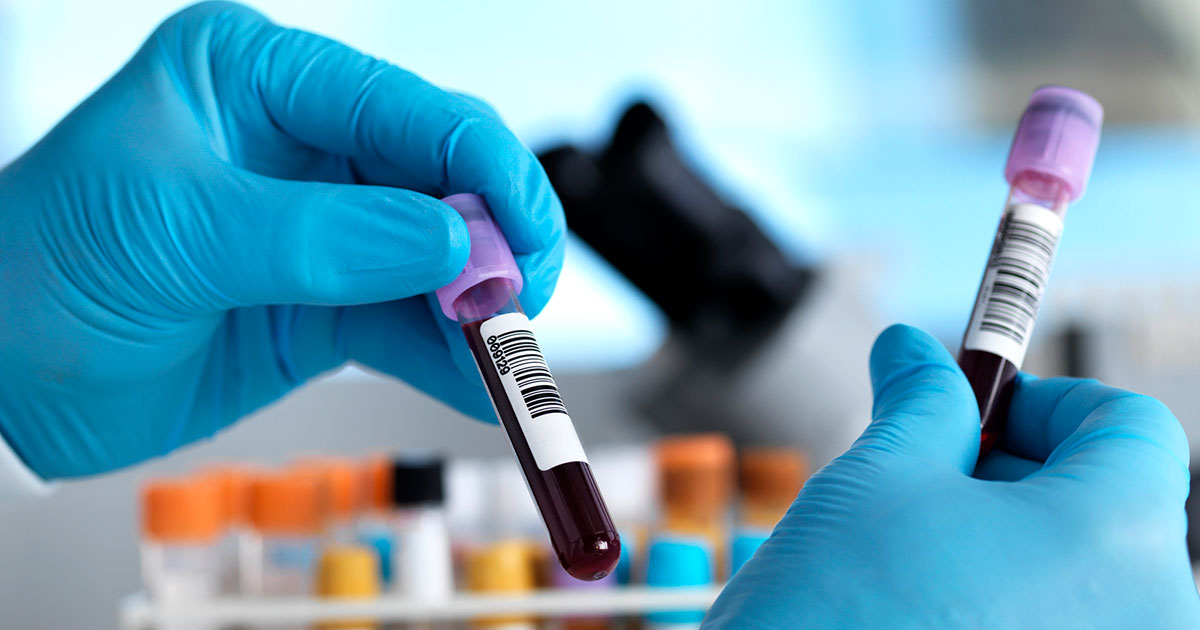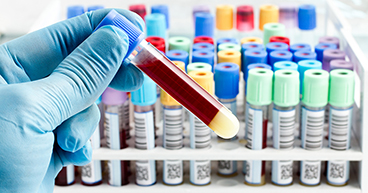
Blood tests are a standard part of annual physical exams and frequently one of the first things ordered when you go to your doctor with an unknown illness. They can show if your cholesterol level is too high, if you suffer from anemia or diabetes, how well your kidneys are functioning and, in general, they provide a good barometer of your overall health.
So, you might wonder, can blood tests tell if you have cancer? The answer, for some blood cancers, is yes. More often, however, the blood test results may provide the first indication of a potential cancer, which then needs to be confirmed or ruled out through additional testing.
“Blood tests are an invaluable part of our tool kit in our quest to detect cancer and diseases in general,” says Paulie Papavassiliou-Bajic, M.D., Ph.D., a pathologist at City of Hope® Cancer Center Atlanta. “They can help signal and flag what may be happening within us physiologically. In some instances, they can be used as a risk assessment screen.”
Advancements in blood testing technology may open new doors in the future. By using science’s rapidly advancing knowledge about the human genome, new research may help identify previously unrecognized markers in the blood that may show the presence of cancer.
Testing blood in this way has given rise to the term “liquid biopsy.” Instead of surgically removing tissue or cells from the body to test for cancer, as is done in a typical biopsy, a liquid biopsy uses blood, urine, mucus or other liquid drawn from a patient to examine for cancer. Some of these tests look for cells broken off from a tumor— or DNA fragments from a tumor cell—floating in the bloodstream.
In this article, we will examine how blood tests are used today and expectations for the future. The topics include:
- The complete blood count and blood chemistry test
- Can a blood test detect cancer?
- What if blood test results are abnormal?
- Blood tests for cancer monitoring
- If blood tests are normal, can you still have cancer?
- Tumor markers in the blood
- A role for liquid biopsies
If you’ve been diagnosed with cancer and are interested in a second opinion on your diagnosis and treatment plan, call us or chat online with a member of our team.
The complete blood count and blood chemistry test
One of the most common blood tests is the complete blood count (CBC), which measures the amount of red blood cells, white blood cells and platelets in the blood. It also includes information about levels of hemoglobin, which is made up of proteins carrying oxygen in red blood cells.
CBC results may show the presence of an infection or inflammation, indicate how well your organs are functioning, determine if you are at greater risk for heart disease or find if you have low iron levels.
Another exam, a blood chemistry test (BCT), also called a basic metabolic panel (BMP), measures chemicals in the blood, which gives your doctor additional information about how your organs are working.
The substances measured by a BCT include electrolytes (such as sodium, potassium and chloride), fats, proteins, glucose (sugar) and enzymes.
Can a blood test detect cancer?
CBC test results may indicate blood cancers such as leukemia or lymphoma by the presence of abnormal cells in the blood, or by abnormal amounts of normal cells found in the blood. For other cancers, however, a blood test alone isn’t typically sufficient for a cancer diagnosis, and other tests will be needed. “They offer data points that can be used to follow trends and can also be used in conjunction with other modalities to help tip the ‘decision-making scales’ when trying to determine what may be happening or how to approach a problem,” Dr. Bajic says.
The American Society of Clinical Oncology lists four cancer-related uses of CBC tests:
- Helping to detect some blood cancers, such as leukemia and lymphoma
- Determining if cancer has spread to bone marrow
- Measuring how cancer treatment is affecting your body
- Finding and monitoring noncancerous conditions during cancer treatment
What if blood test results are abnormal?
Not everyone is exactly alike and, even when healthy, different people may have different levels of blood cells and other markers in their bloodstream. To account for this, scientists have determined “normal values” for these measurements. If a measure comes back higher or lower than the normal range, that is considered abnormal.
Abnormal blood test results may be an indication that cancer is present in the body, but most of the time such results aren’t conclusive. That’s because they may also be due to other health issues that aren’t cancerous.
“Rarely is a single number on a blood test entirely diagnostic for cancer as a stand-alone value.” Dr. Bajic says. “For example, take certain cancers like leukemia/lymphoma that are hematological—blood based—in nature. An elevated level of white cells in the blood, although that raises the suspicion for cancer, is not entirely diagnostic on its own—unless combined with other modalities such as looking at the morphology and phenotype of those cells.”
Some routine additional testing used for a cancer diagnosis includes:
- Physical exams
- Imaging tests (including X-rays, CT scans and MRIs)
- Biopsies to obtain tissue samples
- Urinalysis
Other testing is possible for specific cancers, including:
- Mammograms for breast cancer
- Pap smears for cervical cancer
- Colonoscopies for colorectal cancer
- Myelograms for spinal cord tumors
Blood tests for cancer monitoring
For people diagnosed and treated for cancer, blood tests may help doctors determine if there is any evidence of disease, or if it may be returning.
“Some blood tests predict the likelihood of disease while others may prognosticate,” Dr. Bajic says. “They can also play a role in therapeutics and help guide treatment planning. For instance, they can do this by identifying what may be used to treat a disease or providing information regarding how a disease is responding to treatment.”
If blood tests are normal, can you still have cancer?
Just as an abnormal result doesn’t necessarily mean you have cancer, test results that come back normal don’t guarantee that you don’t. Most cancers are not yet detectable through blood testing.
Blood tests should be seen as one part of an overall screening for potential cancer. Other symptoms, your family history and your own personal history may help guide your doctor in determining what additional testing you may need to have done—especially if you are at risk for certain cancers.
Tumor markers in the blood
If someone has cancer, the presence of a tumor may mean tumor markers are in the blood. These markers may be produced by the tumor cells themselves or by your body’s response to the presence of a tumor. However, even when these biomarkers are present, it’s possible they are not due to cancer. Testing is available for many known markers, including those listed below.
Prostate-specific antigen (PSA): High or rising levels of this protein produced by prostate gland cells in the blood are a warning that prostate cancer may be present.
Carbohydrate antigen 19-9 (also cancer antigen 19-9 or CA 19-9): Testing for this may help in diagnosis, treatment and staging certain cancers.
Blood proteins: This testing looks for abnormal immunoglobulin in the blood, which may be a sign of multiple myeloma, a blood cancer.
Carcinoembryonic antigen (CEA test): When this antigen is found in the blood of an adult, it may be an indicator for several types of cancer, including colorectal, pancreatic, breast, ovarian or lung cancer.
AFP (alpha-fetoprotein): This antigen, when found in the blood of adult males or non-pregnant women, may be a sign of liver, testicular or ovarian cancer.
Beta-human chorionic gonadotropin (hCG): Testing for this in men and non-pregnant women may show the presence of germ cell cancers, such as testicular cancer and ovarian cancer.
Cancer antigen 125 (CA-125): This testing is used to help detect ovarian cancer.
Calcitonin: Tests of these levels are used for the diagnosis of thyroid cancer.
CA 15-3 and CA 27-29: Testing for these antigens is done as part of a breast cancer diagnosis.
A role for liquid biopsies
A whole field of research is underway to produce blood tests that will be much more sensitive to detecting a large variety of cancers.
“We are fortunate to live in an exciting time with many molecular technological advances. Liquid biopsies are great examples of emerging innovative cutting-edge tools,” Dr. Bajic says. “The role of the liquid biopsy has been quite transformative in that it offers a non-invasive way to gather more data. In instances where obtaining a tissue biopsy may not be as feasible, a liquid biopsy may offer easier accessibility.”
City of Hope is a leading cancer treatment and research organization that is delving into potential strategies for liquid biopsies to make cancer detection easier. It is being assisted by TGen, the Translational Genomics Research Institute, a precision medicine research organization that is part of City of Hope.
In January, City of Hope announced that it had developed and tested an innovative machine-learning approach that could one day enable earlier detection of cancer in patients by using smaller blood draws.
“Our technique is more practical for clinical applications as it requires smaller quantities of genomic material from a blood sample,” said Kamel Lahouel, Ph.D., an assistant professor in TGen’s Integrated Cancer Genomics Division and the study’s co-first author. “Continued success in this area and clinical validation opens the door for the introduction of routine tests to detect cancer in its earliest stages.”
In an August 2023 review published in the Cureus Journal of Medical Science, researchers from India reported that “liquid biopsies are clinically helpful in the treatment of lung cancer, breast cancer, colorectal cancer, prostate cancer, and hematological malignancies.”
The review said “liquid biopsies have the potential to completely transform the way that cancer is treated by offering non-invasive, continuous, and thorough molecular profiling. They provide new opportunities for early cancer detection, individualized therapy selection and treatment response tracking.”
These possibilities, such as a single blood test that can be used to detect multiple cancers, may make liquid biopsy a critical part of future cancer diagnosis and treatment.
“It may offer the clinician information regarding treatment options or give indications on how the disease may be responding to a given treatment,” Dr. Bajic says. “In many such ways, it has helped to optimize individualized therapy and has enhanced personalized medicine.”
If you’ve been diagnosed with cancer and are interested in a second opinion on your diagnosis and treatment plan, call us or chat online with a member of our team.

